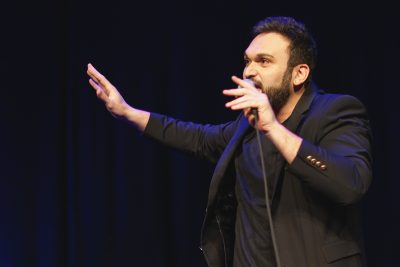
It isn’t uncommon for a comedian to warm up an audience by attempting to connect to the city in which they are performing. The tactic is often used to get a feel for the room — so often, in fact, that the question, “How are you doing tonight, Boston?” seems ingrained into the walls of the Wilbur Theatre, a popular comedy venue in the Theater District.
Nemr, who sold out his Boston show at the Wilbur Saturday, took a different approach. Opening with an articulated and humorous bit on the sophistication of Beantown, he immediately set the tone for a warm and wholeheartedly enjoyable show.
The hour-long set did not disappoint, to say the least. Nemr supplied an abundance of outright gut-busting laughs woven with reassurance and a heartwarming sense of unifying comedy bound to leave even the most stone-faced of viewers with a toothy grin.
The show was founded on a premise of “no politics, no religion,” and was targeted at finding things at which everyone could laugh, regardless of the god they believed in or the candidate they voted for.
While no joke promoted or attacked a particular vision, it was clear that there was one enemy which all audience members could agree upon: ISIS.
Nemr declared comedy to be one of the best weapons against violent extremism and proved so with consideration and sure footing. In the shift from punchy jokes on the pains of hair removal to an address of divisive political climates, he proved that it is possible to discuss dark subject matter while keeping the tone light. His allegorical bits on encouraging, understanding and welcoming others emanated warmth that could be felt throughout the theater.
Recognizing the reasoning behind a religious divide — and proposing solutions to that divisive climate through understanding — was a central focus of the second half of the show.
As a Christian Lebanese-American, Nemr spoke of witnessing heavily divisive attitudes in the Middle East as a child. While his family immigrated to San Diego when he was two years old, they later returned to Lebanon, where he spent his adolescence and college years.
In a particularly moving bit, he spoke of a friend he made in elementary school for the sole reason of shared height — both had experienced early growth spurts — and detailed a sentimental story of how he stood up to those who had been cruel to the friend as a result of a difference in religion. Ultimately, he said to the crowd, the entire school was transformed after they realized that everyone has experienced loss, and that its presence brings opposing groups together.
The Boston show was made notably special in the nature of the audience. At large, it was an amicable and diverse crowd, but special attention was drawn to one member — a Syrian girl who had, three years earlier, helped swim a boat of refugees to shore. She later competed in the Rio Olympics for the refugee team.
As Nemr pointed out, she was deserving of recognition for her remarkable physical feats, but also for her emotional ones. Three years after escaping turmoil in Syria, she was enjoying a comedy show in Boston like any other 21-year-old.
Her presence elicited a thunderous applause and had even greater potency considering the subject matter of the show. Like many of those who conquered violence and extremism, her mention and recognition served as a heartwarming example of the power of hope and positivity.
In an enjoyable and marvelously funny show, Nemr proved that comedy is the best policy, and in his delivery, he showed that even the darkest moments in one’s life can ultimately become a joyful experience in unification.
His message was clear and universal: in order to effect change, one must first accept differences in opinions. Once that is done, it is easy to become a closer global community, unified against divisiveness and violence.
In the end, we all share a hope for a better world. Through humor and kindness, Nemr takes audiences one step closer to achieving that goal once and for all.
















































































































